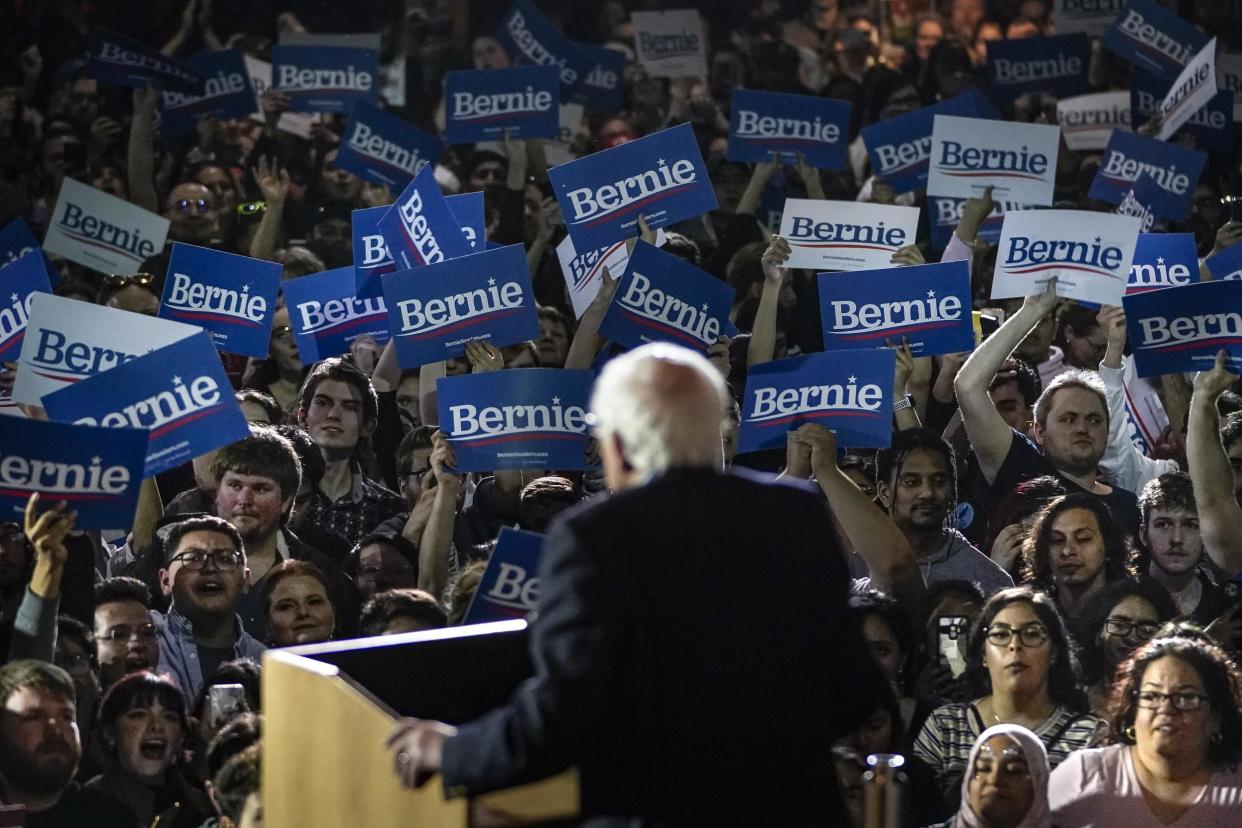Bernie Sanders wants to transform America but his supporters could hand Trump another term

On the evening before the Nevada caucus, a 67-year-old woman called Deborah Cole was having an emotional experience.
Having driven 80 miles from her home in Mesquite, she was now at the Spring Reserve ampitheatre in Las Vegas as Bernie Sanders was about to speak. Her eyes barely flickered away from stage, and she grew passionate as she talked, especially when asked if she would vote for someone such as Michael Bloomberg if Sanders failed to secure the nomination.
“If the Democratic establishment won’t let us have our candidate, I’d rather vote green,” she said. “They think we’re stupid.”
In that exchange was contained the potential for both delight and disaster for Democrats, as they go about selecting a candidate to challenge Donald Trump. Sanders has established himself as the clear frontrunner after wins in Iowa, New Hampshire and Nevada, with the votes of young and enthusiastic supporters, much of if from people of colour.
Yet the passion those people feel for the 78-year-old from Vermont, extends much less to other Democrats seeking the nomination. Of supporters of all the candidates, those who back Sanders say they are less likely to vote for the Democratic nominee if it is not their man.
Such loyalty is displayed not just conversations with people such as Cole, an accountant, but by several polls. One carried out in by Emerson Polling suggested only 53 per cent of current Sanders supporters said they will definitely support the eventual nominee.
In contrast, at least 85 per cent of Joe Biden, Pete Buttigieg, and Elizabeth Warren supporters said they would vote whomever the party nominated.
In interviews with Sanders’ supporters The Independent found the candidate most acceptable as a second choice was Elizabeth Warren, while the least acceptable was former New York mayor Michael Bloomberg.
At the “get out the vote” rally on Friday, one couple disagreed fundamentally on this very issue. Shaun Richards said while did did not like the billionaire businessman, he would vote for anyone to try and and stop Trump. His partner, Jacqueline Bunge, said she could not bring herself to vote for Bloomberg, who aroused in her strong emotions and stern words.
Why does this matter? In 2016, many supporters of Sanders were horrified at the prospect of voting for Hillary Clinton, who many believed was in the pay of Wall Street.
Some said they would vote for “down ticket” candidates – senators and congressman and such like – on election day, and leave blank, or write the name of Sanders, where the ballot paper said Hillary Clinton. Some said they would vote for Trump, who at that time was presenting himself in terms not entirely dissimilar to Sanders, as someone who was not part of the establishment and would clean up the system.
In the end, angered about the way some within the Democratic National Committee had sought to undermine Sanders and support Clinton – revealed by hacked DNC emails published by Wikileaks – and by presence of “super delegates” who gave crucial backing to Clinton, plenty could not bring themselves to support her.
To his credit, at at the party’s convention that summer in Philadelphia, Sanders did his duty in urging his supporters to now back Clinton.
“I understand many people here in this convention hall and around the country are disappointed about the final results of the nominating process. I think it’s fair to say that no one is more disappointed than I am,” he said in one of the most powerful speeches of the political cycle.
“[But] this election is about – and must be about – the needs of the American people and the kind of future we create for our children and grandchildren.”
It was not enough. Polls suggest as many as 12 per cent of people who voted for Sanders in the primary, went for Trump in the general election. Given he only won the White House by 77,000 votes scattered across three states – Wisconsin, Michigan and Pennsylvania – it is impossible to know the impact of such “defections”.
These are emotional, sensitive matters and people need to choose their language with care. Supporters of Sanders are angry when backers of other candidates accuse them of being potential “wrecking balls” in November.
Their opposition to the likes of Bloomberg, who has spent $400m of his estimated $63bn fortune to self-fund his campaign, while Sanders has built his with the support of small donation from ordinary people, most commonly teachers, is understandable.
On Friday night, Sanders said his campaign’s average donation was just $18.53. He said he received cheques from employees at Walmart and Amazon, “people who are earning low wages but who send 20 bucks or so to help bring change”.
And much of what Sanders says about the state of America is undeniably true. Inequality is vast and getting worse, the healthcare system is wasteful and inefficient, and too many people use GoFundMe campaigns to fund their healthcare.
In cities such as San Francisco and Seattle, where corporations such as Amazon escape paying federal taxes, homelessness is out of control. People in tents gather under flyovers and new construction. The criminal justice system, by any measure, discriminates hugely against people of colour.
As supporters of Sanders correctly point out, all of this means the stakes have never been higher.
It also means Bernie Sanders needs to think very carefully what he will tell his supporters if he does not win the race he is currently leading.
Read more
Is Bernie Sanders unstoppable?
Trump accuses Adam Schiff of leaking Sanders-Russia claim
Sanders has proved he can build the support to hand him the presidency
Bernie Sanders propelled to victory by diverse support base
Buttigieg accuses Sanders of adding to ‘toxic tone of our politics’


